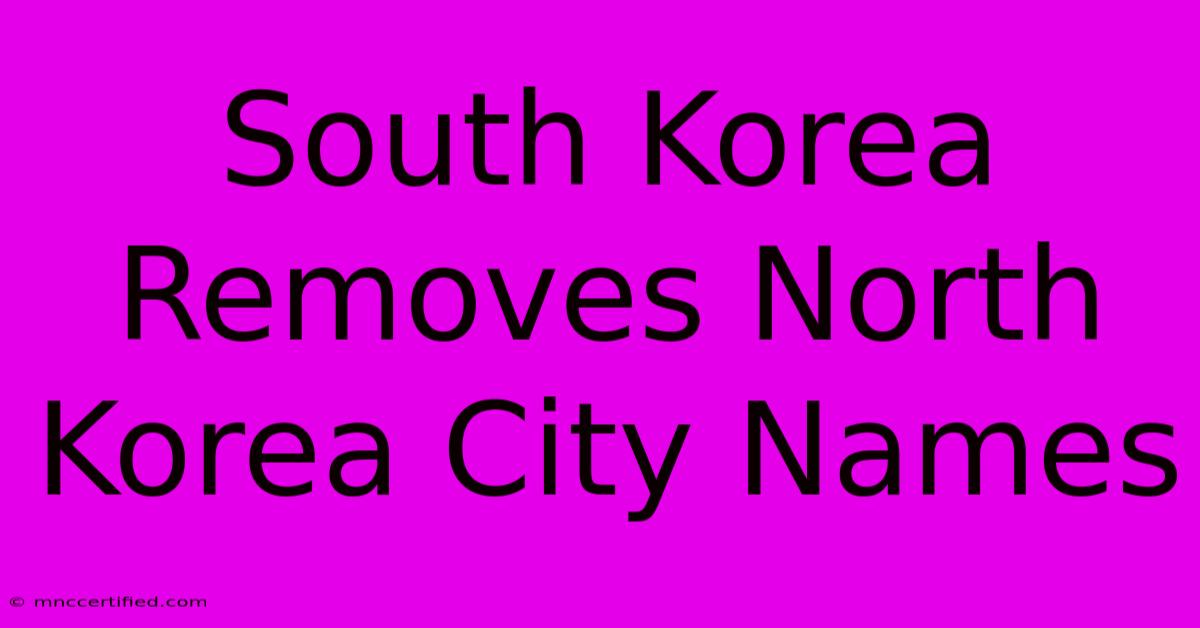South Korea Removes North Korea City Names

Table of Contents
South Korea Removes North Korean City Names from Maps: A Geopolitical Shift
South Korea's recent decision to remove North Korean city names from its maps has sparked debate and underscores the complex geopolitical landscape of the Korean Peninsula. This seemingly minor cartographic change reflects a deeper shift in South Korea's approach to its northern neighbor, raising questions about its implications for inter-Korean relations and national identity. This article delves into the reasons behind this move, its potential consequences, and the broader context of South-North Korean relations.
Why the Change? A Shift in Policy and Messaging
The removal of North Korean city names from official South Korean maps isn't a spontaneous act. It's a deliberate policy decision driven by several factors:
-
Heightened Tensions: Increased military activity and belligerent rhetoric from North Korea have undoubtedly influenced this decision. By omitting place names, South Korea subtly diminishes the perceived legitimacy of North Korean territorial claims, a powerful symbolic gesture in times of heightened tension.
-
National Security Concerns: Some argue that including North Korean city names on maps inadvertently provides valuable intelligence to potential adversaries. Removing them enhances national security by limiting the availability of detailed geographic information.
-
National Identity and Unity: While seemingly subtle, this change strengthens the narrative of a unified Korean nation under Seoul's purview. By focusing solely on South Korean geography, the government reinforces its claim to represent the entire peninsula. This subtly pushes back against North Korea's narrative of separate, independent nationhood.
-
Public Opinion: The decision likely reflects public sentiment. Following years of North Korean provocations, many South Koreans harbor resentment and a diminished sense of empathy towards the North. Removing the names aligns with this prevailing sentiment.
The Implications: Short-Term and Long-Term Effects
The ramifications of this cartographic change extend beyond mere map alterations:
-
Impact on Inter-Korean Dialogue: The removal could further strain already fragile inter-Korean relations. North Korea might perceive this as a hostile act, hindering any potential future dialogue or cooperation.
-
Symbolic Gesture with Real Consequences: While the change might seem insignificant, the symbolic weight is substantial. It represents a hardening of South Korea's stance towards North Korea and could negatively impact any reconciliation efforts.
-
International Perception: This move will be closely observed by international actors, including the United States, China, and other regional powers. It will be interpreted as a signal of South Korea's current policy towards its northern neighbor.
-
Educational and Cultural Impact: The shift will influence how South Korean citizens view North Korea and the broader Korean peninsula. The absence of North Korean place names on maps contributes to a sense of geographical and perhaps even psychological distance.
Beyond the Maps: Understanding the Broader Context
This incident should be analyzed within the broader context of the ongoing geopolitical tension on the Korean Peninsula. It's crucial to consider:
-
The Role of North Korea's Actions: North Korea's nuclear ambitions and provocative military actions have fueled South Korea’s increasingly hardline stance.
-
The Influence of International Actors: The actions and policies of the US, China, and other regional players significantly affect the dynamics of the Korean Peninsula.
-
The Future of Inter-Korean Relations: The removal of city names adds another layer of complexity to already precarious inter-Korean relations, casting a shadow over future reconciliation efforts.
Conclusion:
The removal of North Korean city names from South Korean maps is not simply a cartographic adjustment; it’s a significant geopolitical statement. It reflects evolving South Korean policy toward North Korea, driven by security concerns, national identity considerations, and public opinion. While seemingly minor, this symbolic act holds significant implications for inter-Korean relations and the future of the Korean Peninsula. Understanding this decision requires considering its multifaceted causes and potential consequences within the broader context of regional dynamics. The coming years will reveal the long-term effects of this seemingly small, yet highly significant, change.

Thank you for visiting our website wich cover about South Korea Removes North Korea City Names. We hope the information provided has been useful to you. Feel free to contact us if you have any questions or need further assistance. See you next time and dont miss to bookmark.
Featured Posts
-
Og Maco Passes Away At Age 32
Dec 28, 2024
-
West Hams Fabianski Injury News
Dec 28, 2024
-
Live Updates Syracuse Vs Washington State
Dec 28, 2024
-
Fpl Fabianski Injury Update And Evanilson Analysis
Dec 28, 2024
-
Paul Bamba 35 Passes Away Boxing Loss
Dec 28, 2024